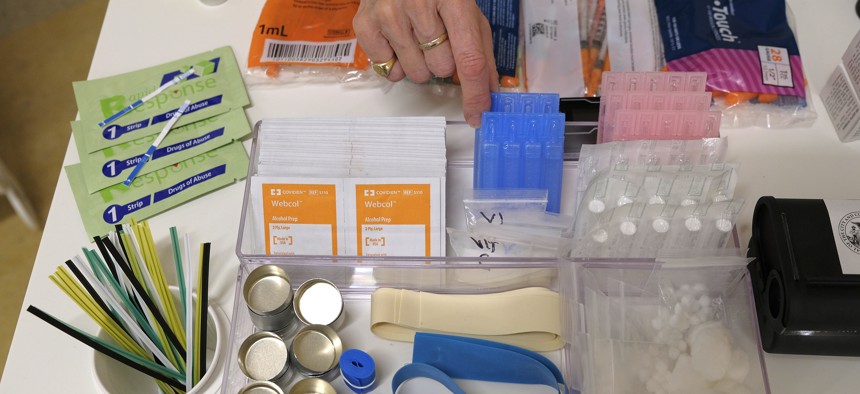Proposed Safe-Injection Site in Philadelphia Found Illegal by Federal Appeals Court

In this Aug. 29, 2018 file photo, Linda Montel shows off supplies on a check in desk at Safer Inside, a realistic model of a safe injection site in San Francisco. AP Photo/Eric Risberg
The U.S. Third Circuit Court of Appeals issued a 2-1 decision that found a plan to open the nation’s first supervised drug injection site violates a federal law passed to shut down crack houses.
A federal appeals court has blocked a nonprofit’s effort to open the nation’s first supervised injection site in Philadelphia, ruling that while admirable, the public health initiative breaks a federal law meant to shutter drug dens.
The 2-1 decision from the U.S. Third Circuit Court of Appeals is a major setback for Safehouse, the nonprofit. The group hoped to reduce the number of opioid-related deaths in the city by operating a site where medical professionals could supervise people’s drug use.
“Though the opioid crisis may call for innovative solutions, local innovations may not break federal law,” wrote U.S. Circuit Judge Stephanos Bibas in the court’s opinion issued Tuesday. “Because Safehouse knows and intends that its visitors will come with a significant purpose of doing drugs, its safe-injection site will break the law.”
The court found that the Safehouse plan violated a federal drug law, adopted in 1986 amid the nation’s crack epidemic, that enabled prosecutors to go after unscrupulous property owners who allowed their buildings to be used as drug dens.
The decision reverses a lower court ruling that found there was “no support for the view that Congress meant to criminalize projects such as that proposed by Safehouse.”
The Safehouse project had the backing of Philadelphia Mayor Jim Kenney, but plans for opening the site fell apart last year amid disagreements over its location.
The U.S. Justice Department applauded the ruling. U.S. Attorney for the Eastern District of Pennsylvania, William McSwain, said the court’s decision “is consistent with Congress’s intent to protect American neighborhoods from the scourge of concentrated drug use.”
Safehouse’s vice president, Ronda Goldfein, said she is considering the nonprofit’s legal options, which could include an appeal to the Third Circuit’s full bench of judges or to the U.S. Supreme Court.
“We remain confident that the law was not intended to force Americans to stand by as idle witnesses while our brothers and sisters are dying,” Goldfein said. “Conscience compels us to pursue all legal options. This case is not over by any means.”
While the Safehouse decision scuttles what would have been the first supervised injection site in the United States, the idea has gained traction in other cities seeking to reduce fatal drug overdoses. The Drug Policy Alliance noted that other jurisdictions are not bound by the Third Circuit decision.
“Advocates across the country—from San Francisco to New York City—should continue to work toward authorization and implementation of supervised consumption sites to address the overdose crisis in their cities and states,” said Lindsey LaSalle, managing director of the policy for the organization.
Drug overdoses have surged in the United States amid the coronavirus pandemic, with 81,000 drug overdose deaths occurring in the 12-month period ending in May 2020, according to the Centers for Disease Control and Prevention. Deaths involving synthetic opioids, primarily fentanyl, increased 38% during that time.
“The disruption to daily life due to the COVID-19 pandemic has hit those with substance use disorder hard,” said CDC Director Robert Redfield in a statement issued last month about the increase.
Despite Safehouse’s “laudable” goal to reduce fatal drug overdoses, Bibas wrote that it was not the court’s job to decide whether the group’s plan was wise. Instead, he said Congress would have to change the law.
“Congress has chosen one rational approach to reducing drug use and trafficking: a flat ban,” he wrote. “We cannot rewrite the statute. Only Congress can.”
In a dissenting opinion, Circuit Judge Jane Richards Roth called the ruling “absurd” and said that under the court’s narrow interpretation of the law, parents who took the harm-reduction measure of allowing an addicted child to use drugs in the home rather than on the street could be prosecuted.
Andrea Noble is a staff correspondent with Route Fifty.
NEXT STORY: Farmers Can be Isolated and Unsure How to Seek Support. One State is Trying to Help.





